Hospitals across Maryland, including Luminis Health, are seeing increased flu-related visits that may lead to longer emergency department wait times. We recommend wearing a mask at all Luminis Health locations, using Virtual Urgent Care for non-emergency needs, and going to the Emergency Department for severe or life-threatening symptoms while we continue to support our teams and care for our communities.

It won’t be long before your kids are back to school, and while you’re making sure they have new clothes and all the supplies they need, be sure to take stock of their mental health.
The National Alliance on Mental Illness (NAMI) reports that one out of every six students ages 6 to 17 has a treatable mental health issue such as anxiety or depression. Like with physical health issues, early identification and intervention can help prevent mental health issues from affecting your child’s academic performance and personal development.
What causes mental health issues in children?
Various factors contribute to mental health issues among students, including:
- Academic pressure: High grades, tests, and college admissions can create anxiety and chronic stress, impacting emotional health. Some levels of stress are normal, but chronic stress can lead to burnout and emotional distress. Encourage your children to take a balanced approach to schoolwork.
- Social dynamics: Positive peer interactions boost self-esteem, while bullying can lead to severe consequences like anxiety, depression, and even suicidal thoughts. Promote healthy relationships for your child and take immediate action if bullying is suspected.
- Technology: Excessive screen time, especially on social media, can foster loneliness and cyberbullying, necessitating healthy digital habits. Monitoring online activities can help mitigate these risks.
- Home environment: Supportive families build resilience, while stress or conflict can magnify mental health issues.
- Overscheduling: Encourage free time for rest and creativity to prevent overscheduling, allowing your kids the space to rejuvenate and explore their creativity without constraint.
Developmental changes
Each academic phase presents unique challenges:
- Elementary school (kindergarten to grade 5). Younger children may experience separation anxiety, difficulty with social skills, and adapting to structured environments.
- Middle school (grades 6 to 8). Pre-teens face the pressures of puberty, identity formation, and increased academic demands. Social acceptance becomes more important to them, and bullying or peer pressure can significantly affect their mental health.
- High school (grades 9 to 12). Teenagers deal with the complexities of preparing for adulthood, including higher academic expectations, romantic relationships, and career planning. Mental health issues such as depression and anxiety often emerge during these years.
Mental health resources
Schools can’t do it alone. Luminis Health recently received a grant from the Maryland Community Health Resources Commission to partner with Prince George’s County Public Schools to implement comprehensive support services at six high schools.
Beginning with the 2024-25 school year, Luminis Health is deploying mental health providers directly to the schools, collaborating with school counselors to offer vital support to students and parents. These embedded providers will rotate through the schools, providing education and training to students, parents, and teachers, ensuring access to evidence-based screening tools for identifying individual needs and strengths on an ongoing basis.
Support Strategies
Here’s how to bolster your child’s mental health:
- Regular check-ins. Talk regularly with your child about their feelings and experiences. Creating a safe space for those discussions can help you identify issues early.
- Mindfulness and relaxation techniques. Help your child explore the benefits of mindfulness, meditation, and relaxation techniques as ways to not manage stress and anxiety, but also to foster a deeper spiritual connection within themselves.
- Physical activity. Regular physical activity, such as sports, yoga, or even walks, can help improve your child’s mood and reduce stress.
- A healthy lifestyle. Make sure your child eats a balanced diet and gets enough sleep. Limiting their screen time can have a positive impact on mental health.
- Professional support. Do not hesitate to get professional help when needed.
Mental health is a fundamental aspect of a student's overall well-being. Understanding the challenges K-12 students may face daily and implementing supportive strategies can help ensure they have the resources and resilience to succeed academically and personally.
If you, or your children, need mental health support, the Luminis Health Behavioral Health Urgent Walk-In Clinic in Lanham is available for anyone ages 4 and older. It is open Monday-Friday, 8 am to 5:30 pm for non-life threatening behavioral health needs. No appointment is necessary.
 Joy Hudson is the clinical director of Behavioral Health at Luminis Health Doctors Community Medical Center.
Joy Hudson is the clinical director of Behavioral Health at Luminis Health Doctors Community Medical Center.



